Justice is one of the essentials maintaining social order. Every country employs its individual judicial system. However, owing to the persistent difficulties experienced in the contemporary judicial systems, the quest for an ideal model has never ended.
There is one essence of the ideal judicial system aspired to across the world; the establishment of a judicial mechanism in which each and every person is fully repaid for his acts without being subject to any form of prejudicial discrimination. Despite new methods, different approaches, and projects and solutions devised to attain this ideal model, however, exercising justice remains a steep road yet to be taken.
The moral deterioration of society accounts for these unfavorable situations. Deterioration, a simple consequence of non-adherence to the values Allah has commanded, brings harm to societies in all domains of life.
|
Allah commands justice and doing good and giving to relatives. | 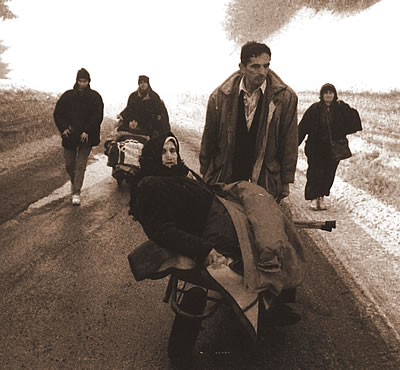 |
Again, this deterioration accounts for swindling, bribery, cheating, injustice and many social evils. Daily life abounds with examples of this sort. A frequently encountered situation in business life, for instance, is businessmen who cheat on their partners and deceive them by embezzling their money, houses or cars. Meanwhile, a longstanding friendship, and the material and spiritual losses the other party suffers, do not mean anything to the swindler. Primarily concerned about his self-interests, values such as friendship, family ties, spirituality, social cohesion and good morals have no meaning whatsoever to the swindler.
All relations this person establishes with anyone else will be under the influence of such a rationale, since he fails to reflect that Allah is aware of all that he does, and that he will account for every act he commits. Never remembering that swindling is an unfair gain and unjust behavior contributes to this crooked rationale.
The following example will contribute to a better understanding: a person who believes that swindling is a horrible crime, will strictly avoid it throughout his life. Once, however, someone thinks he can derive personal benefit, the same person may bear false witness against another, or slander him for something of which he is completely innocent. Meanwhile, he may find refuge in some excuse; that unfavorable conditions compelled him, or his responsibilities to his family laid the ground for such a crime. No matter what these excuses are, the fact remains that slander is wicked under all circumstances.
This aforementioned pattern appears particularly at times when people feel their interests are at stake. This rationale also holds true for thieves, swindlers and oppressors. In a society riddled with such people of vested interests, the existence of injustice, conflicts of interest and disorder is unavoidable.
Nevertheless, no matter what compelling forces there are, a person living by the Qur'an would never stoop to these wicked deeds and never display attitudes inconsistent with its values. Someone having a strong fear of Allah never forgets the fact that one day he will meet each and every deed in which he engages and each and every word he utters. Injustice, which is an outcome of moral deterioration such as only pursuing one's own interests, hoarding possessions, ignoring the needy and those in trouble, has a unique solution; the dissemination of the values of the Qur'an among people. That is because in the Qur'an, Allah commands His servants who believe and live by these superior values to be just:
You who have faith! Be upholders of justice, bearing witness for Allah alone, even against yourselves or your parents and relatives whether they are rich or poor, Allah is well able to look after them. Do not follow your own desires and deviate from the truth. If you twist or turn away, Allah is aware of what you do. (Surat an-Nisa': 135)
Allah commands justice and doing good and giving to relatives. And He forbids indecency and doing wrong and tyranny. He warns you so that hopefully you will pay heed. (Surat an-Nahl: 90)
In a society where people have an understanding of justice as described in the aforementioned verse, injustice does not prevail. That is because in an environment where the values of the Qur'an and the Sunnah are observed, the strict exercise of justice is essential. In the practice of this justice, one's kinship, wealth, status or other factors allow for no exceptions. Nevertheless, current implementations of systems of justice around the globe are rather varied. In some cases, in consideration of someone's wealth, status and social environment, his crimes are simply ignored or his punishment is alleviated or minimized. This is unlikely to happen in a society where real justice prevails. Factors such as kinship, wealth or status never become reasons to deviate from justice.
 |
| Sabah Gazetesi, 9/5/99 - Hürriyet Gazetesi, 10/6/99 |
 |
| Sabah Gazetesi, 19/8/98 |
 |
| Sabah Gazetesi, 26/1/99 |
| Swindling, corruption and theft may become a way of life for a person who does not live by the Qur'an and he may feel no pangs of conscience while engaging in wicked deeds. |
In finding out the truth and in the establishment of the justice, witnesses have a major role. On the basis of eyewitness testimony, many cases can be quickly illuminated, and thus truth and falsehood is distinguished. In societies in which the values of the Qur'an and the Sunnah are not observed, however, finding the truth through witness testimony is far from reliable. This is simply because, people who do not adhere to the Qur'an and the Sunnah can lie as easily as most people breathe in return for benefit or money. While doing this, they turn their backs on all virtuous conduct such as telling the truth or standing up for the innocent.
Even, in some cases, people refrain from testifying on behalf of a particular case, no matter how crucial it might be to render justice. Some unrealistic thoughts, such as fear of getting into trouble or into an unfavorable situation, usually account for such attitudes. In a verse, Allah stresses the importance of disclosing the truth:
…Do not conceal testimony. If someone does conceal it, his heart commits a crime. Allah knows what you do. (Surat al-Baqara: 283)
Malice and hatred felt towards someone may be the reasons that tempt people to fabricate testimonies. By means of false testimony and distorting the facts, they hinder justice. The importance of truthfulness is also explained in a hadith by Allah's Messenger, the Prophet Muhammad (saas):
Adhere to truth, for truth leads to good deeds and good deeds lead him who does them to the Garden. If a man continues to speak the truth and makes truth his objective, he will be recorded in Allah's Presence as eminently truthful. Avoid falsehood, for falsehood leads to wickedness and wickedness leads to the Fire. If a man continues to speak falsehood and makes falsehood his objective, he will be recorded in Allah's Presence as a great liar. 1
People who do not live by the values of the Qur'an and the Sunnah do not observe justice, particularly when they give their interests and personal wishes precedence. Never do they consider the consequences of their false testimony. It never occurs to them what a wrongfully convicted innocent person goes through during lengthy imprisonment, nor what his family suffers. They do not put themselves in the shoes of another and imagine how life would be then…
In the Qur'an, Allah gives special consideration to this situation people experience, and He commands us to be just no matter what the circumstances are:
You who have faith! Show integrity for the sake of Allah, bearing witness with justice. Do not let hatred for a people incite you into not being just. Be just. That is closer to taqwa (piety). Fear Allah. Allah is aware of what you do. (Surat al-Ma'ida: 8)
To avoid injustice, Allah's Messenger, the Prophet Muhammad (saas) also said: "None of you should judge between two persons when he is angry."2
Driven by fear, money, or greed, some people deviate from what is right and fair. Only acquiring the values of the Qur'an will set them free. Under any circumstances, be it under threat or duress, or in the presence of anything of benefit to them, they never tend toward mischief, being aware that Allah surrounds them at every moment. Believers are aware that, in the hereafter, they will have to give account of any wrong actions they do or evil things they say. In one verse, Allah proclaims that the servants of the All-Merciful do not bear false witness:
Those who do not bear false witness, and who, when they pass by worthless talk, pass by with dignity. (Surat al-Furqan: 72)
One more point concerning those who pursue their own interests rather than observing justice deserves attention; one day the same mischief may befall them. If this happens, injustices will certainly disturb them greatly, and they will go in quest for a reliable witness who will not fabricate testimony. Those who would not like to experience this should then strive to spread the values Allah commanded and strictly adhere to the praised moral principles of the Qur'an.
Money and status serve as the main criteria to assess people in societies where the values of the Qur'an and the Sunnah are not adhered to. In these societies, all strata are saturated with this mentality, giving us an abundance of examples to analyze.
The attitudes assumed by a storekeeper towards two different customers provide striking clues about this issue. The storekeeper assumes a polite and attentive attitude towards the one whom, from his appearance, he assumes to be well-off. The other customer, on the other hand, who looks rather poor, is not treated so well by the storekeeper. This attitude does not change although both customers visit the store to buy the same things, and spend the same amount of money. Appearance or status determines the way the storekeeper treats his customers.
These criteria do not hold true for someone who lives by the Qur'an. A believer is well mannered towards another human being simply because he is a "human being". He does not subject people around him to prejudicial discrimination of any kind. To appreciate someone, he does not need "labels". Whether a person is wealthy or poor, whether he lives in a hut or a mansion does not matter to him. One's costly clothes, pretty face, graduate degree from a prestigious university, social standing, or similar status symbols have no meaning whatsoever to him. Allah, in the Qur'an, mentions one's faith in Allah and closeness to Him as the sole criteria to apply in loving people.
Every individual is entitled to have access to education. Regardless of religion, language, race or status, every individual has the right to strive for knowledge. Social injustice, however, renders this virtually impossible, introducing many problems demanding immediate solution, the foremost being unavailability of free education for every member of a community. In many countries, due to poverty, huge numbers of children and teenagers are deprived of quality education. Access to a handful of quality schools is reserved for a privileged minority. The ordinary people hardly receive schooling addressing their actual educational needs. In this context, the richer receive better education, while the poorer simply get what the system provides.
The development of children can be fostered by laboratories and many other means provided by schools receiving adequate material support. The limited resources of some schools, on the other hand, hinder young individuals in many ways.
People ought to be allowed to receive education in any field they wish. Indeed, an educational system in which people are given the chance to receive schooling on the basis of their interests, tendencies and skills proves to be more beneficial to the society and more productive. However, in our day, economic and social conditions force many people to terminate their schooling prematurely or continue it in a field in which they are not interested.
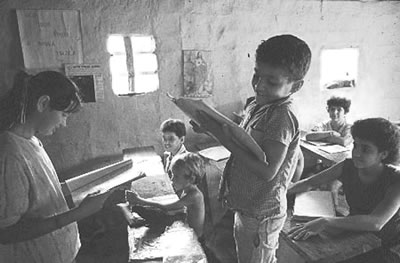 | |
| Education is a major issue around the globe. | |
Living by the Qur'an addresses such social problems and brings solutions, since the environment these values ensure does not allow for inadequate educational services. Endowed with the wisdom and the faculty of comprehension that adhering to the Qur'an brings, people act as solution-providers in education, as they do in all other spheres of life. Furthermore, in such a society, no prejudicial distinction between poor and wealthy exists. As mentioned earlier, those who love Allah spend what they do not need for the benefit of others. Once these accumulations are channeled into the many fields demanding immediate solution such as public education and health, it takes only a moment for these problems to be solved. If this were adopted around the globe, the distinction between poor and wealthy countries would fade. Rich countries would transfer their excess resources to underdeveloped countries without expecting anything in return.
Providing solutions is surely a major task for which Muslims are responsible since they are held responsible for providing young people the sort of education that will guide them in living according to the Qur'an. This is the type of education that illuminates a person about his or her actual purpose in life, and shows them the signs of Allah on the earth and in the universe. If this does not happen, new generations, who become the subjects of the indoctrination of irrelevant disbelieving ideologies, will grow into non-productive adults of little use to their country, nation and religion. Improper education provided for young people accounts for their adopting undesirable lifestyles and consequently being devoid of the blessings the true religion presents and going astray. Surely, a man with fear of Allah and conscience would not risk this responsibility.
In societies devoid of real justice, the inequality of women and men is a serious social issue posing major problems. In many countries around the world, women are often treated as second-class citizens and even outcasts. Perceived as weak and protection-seeking beings, they are often abused. For the same reason, they do not hold a role in society that commands respect or authority.
In societies where such prejudices prevail, a woman with a remarkable career in business life hardly finds acceptance. Generally, women are regarded as people who lack self-confidence and determination, and who have poor intellectual faculties. This rationalization of a "typical woman”stereotype in society wrongly serves as an explanation for every mistake a woman makes. In reality, such mistakes are not peculiar to women but are universal among human beings.
Among candidates applying for job vacancies, men are usually favored over women, even if they possess exactly the same backgrounds, intelligence and skills. This tendency explains why there are such limited opportunities available to women in business life.
On the other hand, the majority of women identify with this image attributed to them. This identification makes them readily assume the inferior roles assigned to them in many societies.
 |
| Sabah Gazetesi, 26/4/99 - Sabah Gazetesi, 3/10/98 - Hürriyet Gazetesi, 9/3/98 Gender inequality in social life still has striking consequences in many countries today. These are among the ordinary incidents appearing every day in the press. |
Prejudices in social life towards gender differences have striking consequences in underdeveloped countries. Let alone their entitlement to education and work, they are even deprived of making their own decisions about marriage. All sorts of women's personal decisions rest either with their fathers or husbands.
There is an on-going effort to provide solutions to these flawed implementations, only a few of which have been included here. Associations founded to protect women's rights, concepts such as freedom and equality, or the feminist movement or seminars, panels and discussions have not contributed much towards a workable solution. All these efforts prove that these solutions inherently breed more complications. This is a natural consequence since the real solution, as in all other domains, is unique: adherence to the Qur'an.
The men and women of the believers are friends of one another.
They command what is right and forbid what is wrong and establish prayer and pay alms, and obey Allah and His Messenger. They are the people on whom Allah will have mercy. Allah is Almighty, All-Wise.
(Surat at-Tawba: 71)
In a society adhering to the Qur'an and the Sunnah, no prejudicial distinction is made between the individuals of a society whether women, men, wealthy, poor, young or old. Social standing, profession, wealth, or gender do not make people enjoy particular privileges. The good deeds one engages in and one's fear of Allah distinguish one, as is commanded in the verse "Take provision, but the best provision is fear of Allah." (Surat al-Baqara: 197) In the Qur'an, people are not classified prejudicially as men or women. Allah addresses both men and women having faith in Him and engaging in good deeds. Allah stresses the importance of living by the values He commands. In that respect, being male or female has no significance. Some of the verses stressing this are as follows:
The men and women of the believers are friends of one another. They command what is right and forbid what is wrong and establish salat and pay zakat (regular charity), and obey Allah and His Messenger. They are the people on whom Allah will have mercy. Allah is Almighty, All-Wise. Allah has promised the men and women of the believers. Gardens with rivers flowing under them, remaining in them timelessly, for ever, and fine dwellings in the Gardens of Eden. And Allah's good pleasure is even greater. That is the great victory. (Surat at-Tawba: 71-72)
Men and women who are Muslims, men and women who are believers, men and women who are obedient, men and women who are truthful, men and women who are steadfast, men and women who are humble, men and women who give in charity, men and women who fast, men and women who guard their private parts, men and women who remember Allah much: Allah has prepared forgiveness for them and an immense reward. (Surat al-Ahzab: 35)
Anyone, male or female, who does right actions and is a believer, will enter the Garden. They will not be wronged by so much as the tiniest speck. (Surat an-Nisa': 124)
In societies distant from religion, women encounter many difficulties, and, in particular, those experienced after a divorce deserve special mention. A divorce creates many problems for a woman who has been prevented from working by her husband, and hence has come to depend economically upon him.
That the majority of women do not have a profession, that they are not young enough to go to work, or that they are not entitled to any social rights make conditions hard for divorced women. The additional benefits divorcing parties demand from each other and their insistence on pursuing their own interests contribute to conflicts between the parties and make the situation even worse.
In a society of believers, however, people do not go through such trouble when they adhere to the Qur'an and the Sunnah. The respect and love felt at the beginning of a marriage is not lost when the parties decide to terminate their marriage since it is done by mutual consent. This attitude is consequent upon the rationale that parties do not perceive each another merely as a man or a woman, but as human beings having faith in Allah, and thus Allah's most elevated creation. This attitude maintains courtesy after a divorce.
There are many measures taken in the Qur'an securing a woman's rights after divorce. The ones pertaining to her economic situation maintain the welfare of a divorced woman. The following verses inform us about the benefits and monetary assistance specified by the mutual consent of both parties as well as the treatment due a woman after separation:
Divorced women should receive maintenance given with correctness and courtesy: a duty for all who are righteous. (Surat al-Baqara: 241)
… Give them a gift – he who is wealthy according to his means and he who is less well off according to his means – a gift to be given with correctness and courtesy: a duty for all good-doers. If you divorce them before you have touched them but have already allotted them a dowry, they should have half the amount which you allotted, unless they forgo it or the one in charge of the marriage contract forgoes it. To forgo it is closer to fear of Allah. Do not forget to show generosity to one another. Allah sees what you do. (Surat al-Baqara: 236-237)
He who has plenty should spend out from his plenty, but he whose provision is restricted should spend from what Allah has given him. Allah does not demand from any self more than He has given it. Allah will appoint after difficulty, ease. (Surat at-Talaq: 7)
Again from the verses, we know that, after the divorce, it is not lawful for a man to keep anything he had given to his wife during the marriage. All needs of a divorced woman related to housing are also guaranteed during the waiting period after the divorce. According to the Qur'an, it is also unlawful to inherit women by force.
What has been related so far reveals that adhering to the Qur'an brings solutions. In a society where people live by the Qur'an, women are not subjected to maltreatment and dishonored as in other societies.
Today, all individuals around the world do not have equal access to resources. An adult male's basic energy need is around 2,800 calories a day. The nutritional resources available on the planet are adequate to meet every individual's needs. Still, however, much of the world is excluded from these benefits and more than 800 million people on earth suffer from extreme malnourishment. The daily calorie intake of 75% of the world population (estimated at 6.85 billion people as of 2010) is much below the minimum calorie-intake level. The number of malnourished people changes from one country to another, owing to the uneven distribution of food around the world. Another statistic indicates that meeting the basic needs of the populations of developing countries (food, drinking, water, sanitation, health care and education) would cost roughly 40 million Dollars a year. This figure equals a mere 4% of the combined wealth of the 225 richest people in the world.3
As these statistics also indicate, excess resources in some countries are unavailable in others, although of vital importance. In rich countries, some resources no longer in use remain idle even though they could be transferred to poor countries. The misery of some African countries is an example with which everyone is familiar.
Global inequities are not restricted to food and water. The same inequity is also true for health services, and that creates serious problems around the world. Through research and breakthroughs in the domain of medicine, many illnesses can easily be cured and prevented today. This is possible through the medical technology employed by rich countries coupled with their financial means. Hardly the same can be said of underdeveloped and developing countries, however. Minor health problems, with which the wealthy countries easily cope, pose serious threats in poor countries.
For instance, leprosy, also known as Hanson's Disease, is an insidious bacterial disease that flourishes mainly in the 'poverty belt' of the globe. This disease, which has afflicted humanity since time immemorial, can be treated relatively easily in our day. Leprosy poses a major threat in poverty-stricken countries, yet there are only sporadic, or even no, cases reported in the developed world. That the treatment is long and costly is the major reason it has not been eliminated in poor countries. Yet, the fact remains that medical aid provided by rich countries could contribute to the elimination of the problem.
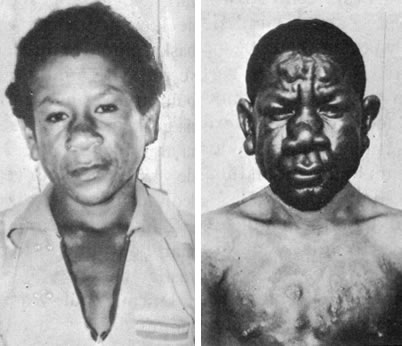 | |
| Cüzzam hastalağına yakalanmış 14 yaşında bir Endonezyalı. | |
When all health problems are considered in general, leprosy is but the tip of the iceberg. In underdeveloped countries, technology is impotent in the face of many other epidemics. In addition, with the lack of financial means, it is unlikely to treat, let alone be able to eradicate these diseases. However, the solution to all health problems is simple: through rational organization, many methods can be put into practice, such as the transfer of idle medical equipment stored in the warehouses of developed countries to the poor countries.
Global inequities are also apparent in the availability of agricultural and information technology around the globe. To expand agricultural areas, developed countries invest heavily in research on agricultural and irrigation technology, rendering agricultural activities possible in unproductive lands, even in deserts. Today, irrigation systems are being transformed by the power of information technology. Computer-supported irrigation systems, aimed to keep water loss to a minimum, channel water directly into the roots of the plants beneath the soil, saving every single drop for the benefit of agriculture. Projects have been introduced to refine all water resources, such as sea and flood water for use in watering deserts.
These modern agricultural methods render productivity possible even in the deserts. This is all good news. Yet, that these innovations are not accessible to poverty-stricken countries, remains a problem to which one seriously needs to give thought. The poor technology employed by these countries does not yield high productivity even in fertile soils, making hunger a serious threat for their people.
<
 | 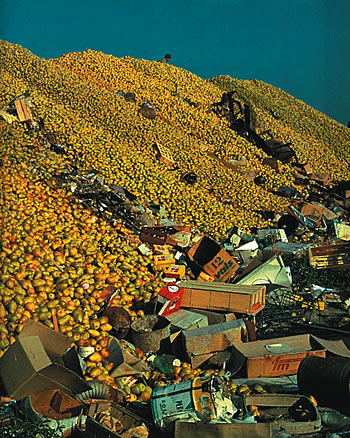 |
| Today in some countries, truckloads of vegetables and fruits are discharged on to wastelands. Yet, the fact remains that, around the planet, there are millions living on the bread-line. The rational allocation of world resources could prevent extravagance while saving starving people in different areas of the world. … Eat of their fruits when they bear fruit and pay their due on the day of their harvest, and do not be profligate. He (Allah) does not love the profligate. (Surat al-An'am: 141) |  |
In some cases, the whole population of a country lives under the threat of hunger. The press devotes many pages and television broadcasts to such human misery, making everyone aware of the situation, yet failing to create insight in people to bring solutions. Solutions are sought in temporary measures and short-term projects, yet such feeble measures lacking insight produce no results.
At this point, people really require rapid and workable solutions that address actual needs. Today, poverty-stricken countries receive large amounts of food aid. Yet, most of these serve no good as they are simply made for show-purposes and are inconsistent with the needs of famine sufferers. Alternatively, being delayed, or due to interruptions within the organization, the food rots before reaching its destination. Associations are set up to organize this aid. However, these associations lack credibility, since they are often full of corruption.
 |
| The fact that millions of people still suffer from hunger in the world, is a token of the inefficient use of world resources. |
 |
| Cumhuriyet Gazetesi, 16/10/99 |
 |
| Milliyet Gazetesi, 6/1/99 |
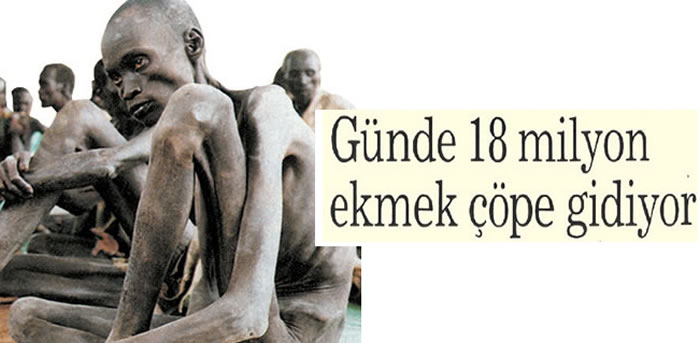 |
Behind the failure to reach concrete solutions lie egoism, vested interests, ambition, heedlessness and other similar moral weaknesses. The only way to end these moral imperfections is to communicate the Qur'an to people and remind them that we will give an account of all our acts in the hereafter.
As in the previous examples of the issues regarding health and education, justice will end many problems around the world. However, one point deserves special mention here: when we say fair distribution, one should not understand that everything will be available to everyone everywhere in the same amounts. What is actually meant is meeting people's needs completely. Surely, a special irrigation system employed in the deserts will not be of use elsewhere. Similarly, one would not expect a nation to send medicine to another country while there is a need for it within that country itself. Furthermore, it is not essential that every citizen should possess exactly the same amount of possessions. What really matters is that there should not be some people indulging in extravagance while, next to them, there are people suffering from poverty. The avoidance of an unbridgeable gap between poor and rich is essential.
Once the command of Allah, "They will ask you what they should give away. Say whatever is surplus to your needs." (Surat al-Baqara: 219) is adhered to, the fair distribution which will lead societies to peace will spontaneously appear.
 |  |
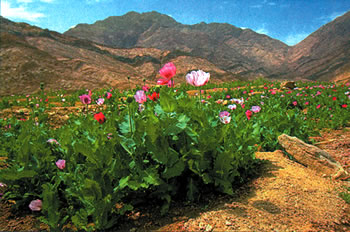 | In our day, dry arid land can be transformed into productive fields, through agricultural technology employed by some countries like the United Arab Emirates and Israel. The same technology should immediately be transferred to drought-stricken countries. |
They will ask you what they should give away. Say, 'Any wealth you give away should go to your parents and relatives and to orphans and the very poor and travelers.' Whatever good you do, Allah knows it.
(Surat al-Baqara: 215)
Once all these facts are considered, we arrive at the conclusion that only living by the Qur'an will ensure a completely fair social structure. That is because only the morality of the Qur'an brings moral conduct and wisdom. Selfish, egotistical, heedless people will change into merciful, just people who think for the good of others and thus provide solutions. This simply means the end of many problems.
Then when they forgot what they had been reminded of, We rescued those who had forbidden the evil and seized those who did wrong with a harsh punishment because they were deviators.
(Surat al-A'raf: 165)
In societies enjoying real justice, people do not stoop to moral weaknesses such as pursuing vested interests, fraud or violating another's rights. The basic Qur'anic teachings command matters such as co-operation and mercy, which are the essence of a just society. In such a society, everyone safeguards each other's interests, and thus the rights and interests of all are secured. This is what brings overall peace and security to society. In this sense, the responsibility of all believers is to communicate the values Allah praised and the just religion to the whole world. This is one of the most important attributes of the believers. Allah reveals in the verses as such:
Let there be a community among you who call to the good, and enjoin the right, and forbid the wrong. They are the ones who have success. (Surah Ali 'Imran: 104)
Those who make tawba (repentance), those who worship, those who praise, those who fast, those who bow, those who prostrate, those who command the right, those who forbid the wrong, those who preserve the limits of Allah: give good news to the believers. (Surat at-Tawba: 112)
Allah mentions the existence of people who live by these values and accordingly summon people to them. Only those making people avoid wicked deeds will attain salvation:
Then when they forgot what they had been reminded of, We rescued those who had forbidden the evil and seized those who did wrong with a harsh punishment because they were deviators. (Surat al-A'raf: 165)
1. Muslim Vol. 4 Hadith 6309
2. Muslim Vol. 3 Hadith 4264
3. UNESCO the COURIER, March 1999, p.22